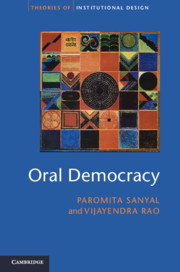Oral Democracy
Oral Democracy studies citizens’ voices in civic and political deliberations in India’s gram sabhas (village assemblies), the largest deliberative institution in human history. It analyzes nearly 300 transcripts of gram sabhas, sampled within the framework of a natural experiment, allowing the authors to study how state policy affects the quality of discourse, citizens’ discursive performances, and state enactments embodied by elected leaders and public officials. By drawing out the varieties of speech apparent in citizen and state interactions, their analysis shows that citizens’ oral participation in development and governance can be improved by strengthening deliberative spaces through policy. Even in conditions of high inequality and illiteracy, gram sabhas can create discursive equality by developing the “oral competence” of citizens and establishing a space in which they can articulate their interests. The authors develop the concept of “oral democracy” to aid the understanding of deliberative systems in non-Western and developing countries. This title is also available as Open Access.
Paromita Sanyal is an Associate Professor in the Department of Sociology at Florida State University. She has written Credit to Capabilities: A Sociological Study of Microcredit Groups in India (Cambridge University Press, 2014), which won an Outstanding Book Award from the American Sociological Association. Her work has also been published in leading sociology journals, including the American Sociological Review.
Vijayendra Rao is Lead Economist in the Development Research Group at The World Bank. He coedited Culture and Public Action (2004), and coauthored Localizing Development: Does Participation Work? (2012). He has published in the leading journals in economics and development studies, and he is a member of the Successful Societies Program at the Canadian Institute for Advanced Research.

